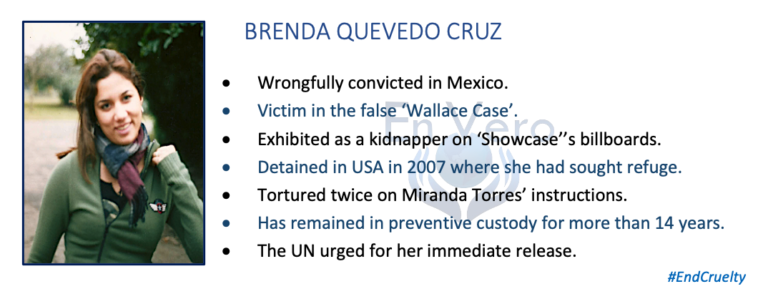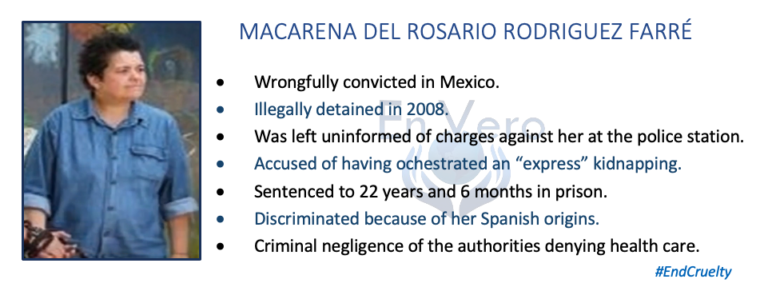Source: Animal político
Author: Arturo Angel
November 1, 2018
Translation: Jorge B (Original publication in Spanish on Oct. 22, 2018)
They tortured him to confess a murder and then sentenced him; seven years later, the Court revokes the sentence
The defendant reported that he was tortured into accepting that he killed a woman, but trial judges ignored him and sentenced him to 32 years in prison.
Mexico’s Supreme Court of Justice of the Nation (SCJN) decided to revoke a sentence of 32 years in prison imposed on a person for the murder of a woman in Veracruz, after concluding that the trial judges ignored that the defendant’s incriminating confession, in which the whole case was based, might have been obtained under physical and psychological torture.
This is the case of Yarold Christian Leyte Quintanar, in prison for almost seven years in a Veracruz penitentiary. His story, including the narrative and evidence of the torture he went through and the multiple irregularities surrounding the procedure, was addressed by Animal Político in this note and in the news article Killing in Mexico: Guaranteed impunity, published last May.
The decision of the First Chamber of the Court does not mean the automatic release for Yarold, however, it is an “amparo” or the court’s protection that for the first time, and after four years of legal battle, revokes the conviction and orders a judge to review if the evidence which already exists (among them expert reports that prove the injuries that Yarold suffered after being arrested) attest to the torture.
In the event that there is currently lack of sufficient evidence to prove it, the SCJN ordered the judges to conduct a thorough investigation, including the application of the Istanbul Protocol.
The Court’s decision, of which we have copy, condemns the fact that the Veracruz judge who initially handed down the ruling did not even order that an investigation of the torture, denounced at trial, be carried out. That is to say, it completely ignored the fact.
The judge of first instance had issued a sentence without ordering that an investigation of the torture denounced at trial, be carried out. He completely ignored the fact.
And it also considers that the decision of a federal Court was incorrect, which after analyzing the case for the second time ordered that the torture were investigated but, at the same time, it upheld the sentence against Yarold, minimizing the fact that his questioned confession was the central piece of the accusation by the Public Ministry of Veracruz.
“To dismiss a complaint of torture, without the corresponding investigation being carried out, it necessarily places who alleges it in a defencelessness state since by failing to confirm his statement, it leaves out the analysis of the possible unlawfulness of the evidence with which the sentence will be handed down (…) it will only be possible to determine the impact of the torture in the criminal proceedings, once it has been proved, as a result of a thorough and diligent investigation,” states the judgment of the Court corresponding to the amparo 1389/2018 under revision.
The fabricated case
Only in 5 out of 100 murders committed in Mexico the perpetrator of the crime ends up being prosecuted and sentenced. It is an impunity rate of 95 percent. Worse yet: there are cases where the defendants accused of committing the crime are not the real murderers, but people for whom evidence has been fabricated to incriminate them at the time.
The news report “Killing in Mexico: Guaranteed impunity” addressed as a part of this aspect the case of Yarold Christian Leyte Quintanar, sentenced to 32 years in prison for the murder of the executive of the bank “Compartamos,” Maria Teresa González González, which took place in 2012, in Tuxpan, Veracruz. A few days after the murder, judicial police arrested Yarold, who was shown in the media as “the murderer of Valle Alto.”
Access the video “Killing in Mexico: The Case of Yarold Leyte” (Spanish): here.
The key evidence of the Public Ministry against Yarold was his alleged confession, in which he says that he accidentally killed González inside his house because he struggled with her after she came looking for him to collect a debt he had with the bank.
The investigation presented multiple irregularities that were documented in the file, and that Animal Político was able to verify. For example, there is the testimony of the bank manager where the murdered woman worked, who denied that Yarold was a customer and had a debt with them. There is also the analysis of the official expert who ruled that the victim did not die in the house of Yarold (as claimed in his alleged confession), but where she was found: a house opposite the address of the defendant.
But above all there is the detailed complaint by Yarold, in which he points out that his confession was fabricated and that he signed it after being tortured for a long time. There are ministerial and expert evidence that prove that Yarold was detained by the MP for several hours before being handed to the MP, and that he had several physical injuries and psychological damage.
The full story of his arrest and the narrative of his torture can be found in this episode of the miniseries that accompanied the news report Killing in Mexico. Here is a recovered fragment of the abuse that Yarold suffered at the hands of the policemen that arrested him, as told by his mother:
“They start by attempting to drown him and then straightening him up, then they start giving him electrical shocks… even so he refused to confess, but then they sawed a weapon, pointed it at his head telling him that they were going to kill him. My son, in spite of all that, continues saying that he does not know what murder they are talking about and that does not know the victim. It is at this point they suddenly tell him that he is going to confess because he is going to confess; then they pull him up by the hair, bring him to a fence, and he hears his wife crying. They tell him that if he does not confess they are going to kill his wife and one of his children… it is then when he agrees to sign the statement that they had prepared for him…”
In spite of the above the Tuxpan judge in charge of the proceedings maintained Yarold’s confession as valid evidence, and four years after the arrest —and due to pressure from the defence to issue a sentence—the judge sentenced the young man to 32 years in prison. From that moment on, the legal battle with appeals and amparos began in several courts and tribunals, including federal courts, which ended in the Court’s decision revoking this sentence.
What comes next for Yarold?
The decision of the Court’s First Chamber finally rendered ineffective the 32-year prison sentence that had been handed down to Yarold. However, this does not mean that the young man can regain his freedom.
What the ministers ordered was that the case be returned to the judges but with the order to analyze if the evidence that already exists is sufficient to validate the torture suffered by the defendant and, if so, to declare illegal both his confession and all evidence resulting from it.
Yarold’s lawyer, Guadalupe Salmones Gabriel, said that if this happens the case would be automatically without sufficient elements to stand on its own, which would lead to the young man’s freedom.
But in case there is not sufficient evidence of torture at this time, the Court ordered that a thorough investigation be carried out and that the Istanbul protocol be applied, which allows to prove whether a person was subjected to this type of abuse or not. If this is the scenario, the resolution could be known in approximately one year.
In this context lawyer Salmones Gabriel considered that the resolution of the Court “fell short” and was a “Solomonic” decision because although it represents a key advance in the case, it could have gone further and order once and for all the closure of the case considering the accumulation of irregularities that have been documented.
“Yarold has already been in prison for almost 7 years and will still have to wait since, for example, the judicial system in Veracruz does not have a certified staff that applies the Istanbul protocol, which in turn will have to wait for the support of the State Human Rights Commission that does not have that staff either, and then it will have to request for such assistance at the national level. That is to say, this is a cumbersome process because the system of justice in Mexico is not expeditious,” said the litigant.
Despite this situation the lawyer is convinced that Yarold’s freedom is just a matter of time, not only because the torture he suffered is fully verifiable (with expert reports ratifying the injuries), but because this case has lacked the minimum elements of evidence since the beginning.
“Unfortunately (Yarold) did not have a real defence from the start and that affected things a lot. The appointed lawyers were there, but they did not do any work. We had to get to this last instance. Today we are clear that Yarold is going to leave, but unfortunately it will not be immediately,” said the litigant.
Access to the Decision of Justice regarding the Appeal (Spanish): here.




